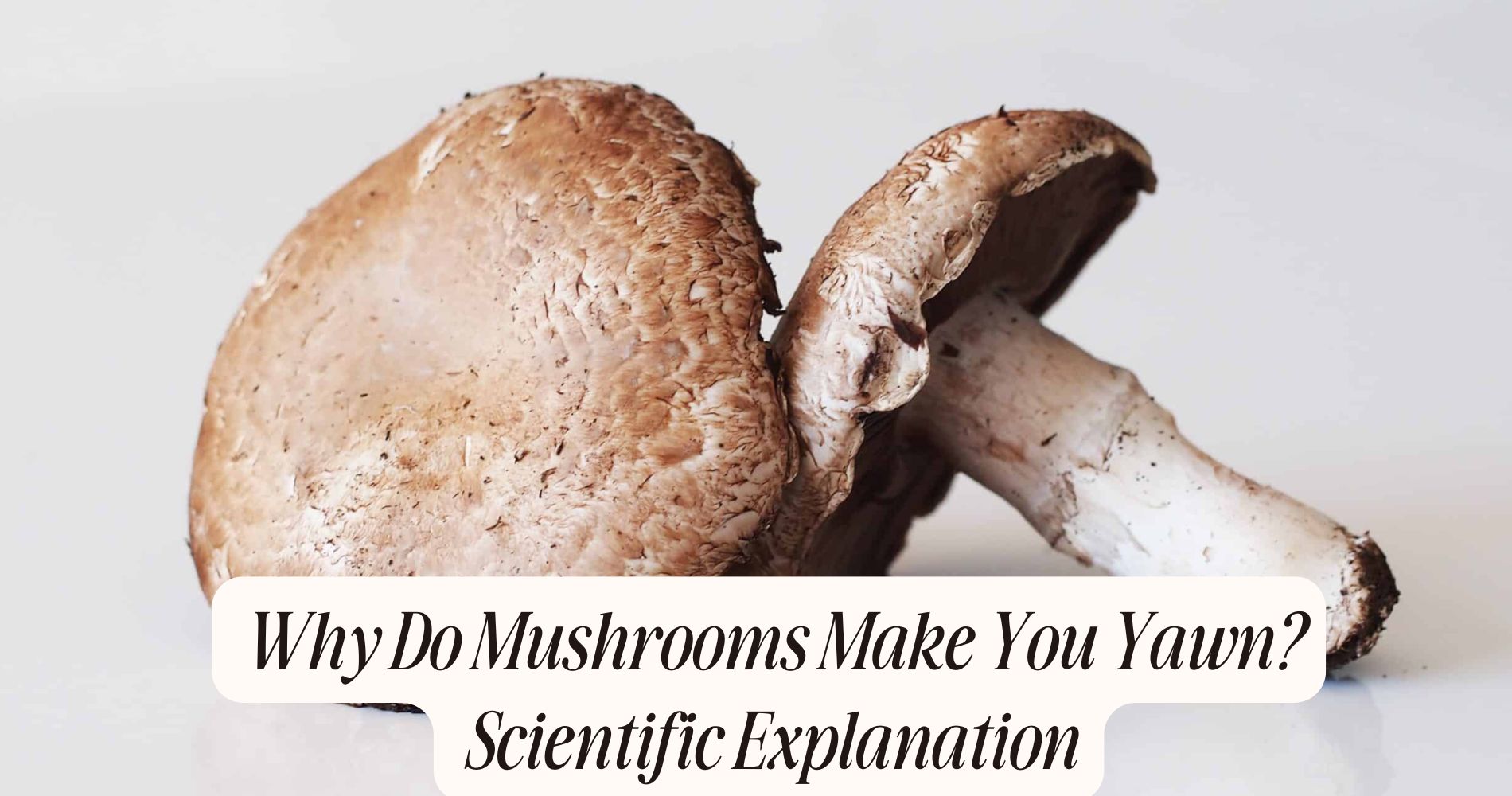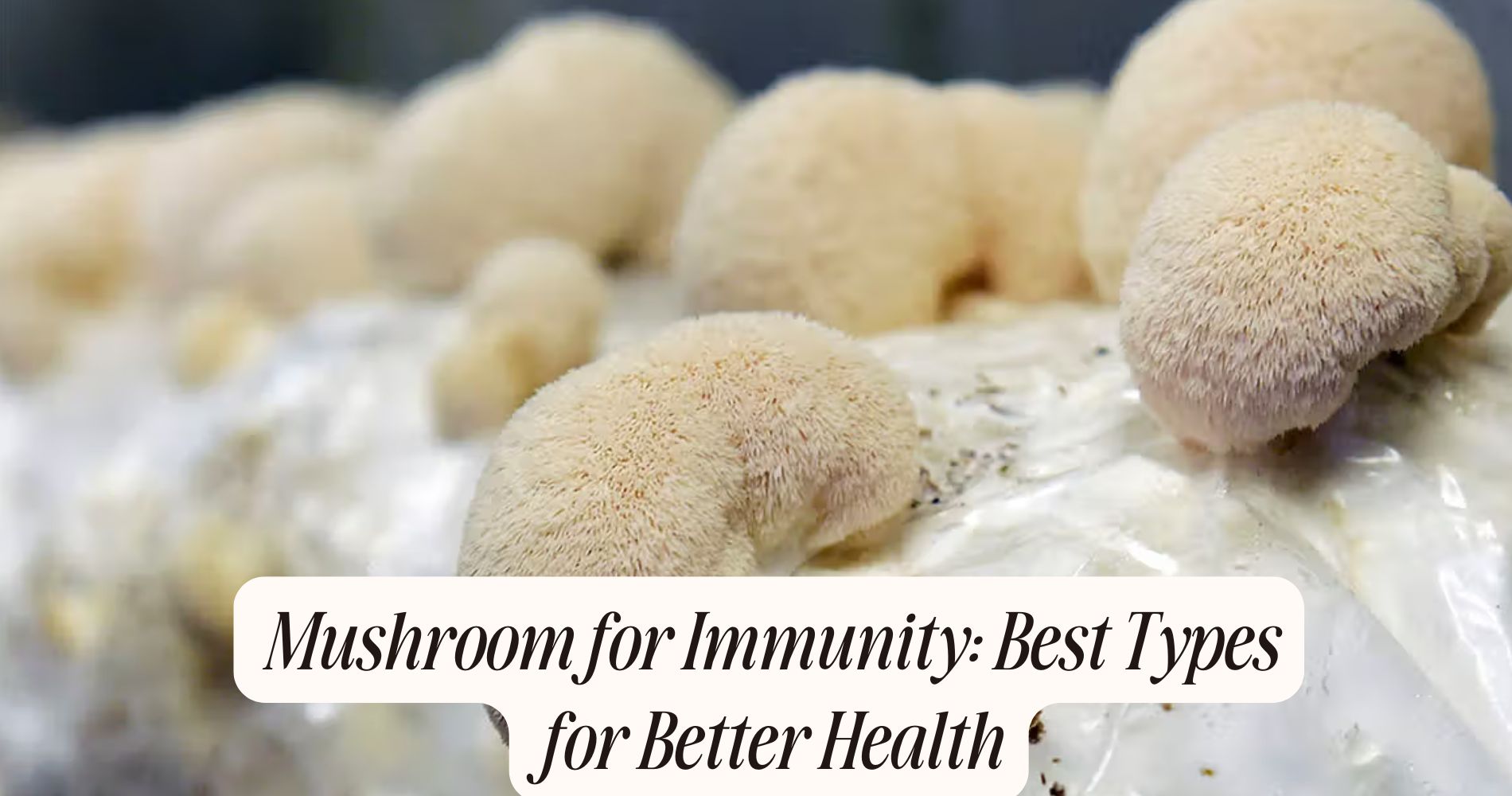
Why Do Mushrooms Make You Yawn? Scientific Explanation
Why do mushrooms make you yawn? Mushrooms can make you yawn because they influence neurotransmitter activity and oxygen levels in your body. Their rich nutritional content, especially B vitamins, helps boost serotonin production, which can lead to increased yawning as your brain adjusts. When you're low on oxygen, yawning serves as a natural respiratory response, and mushrooms might affect how your brain perceives oxygen levels. Plus, the calming compounds in certain mushrooms promote relaxation, further contributing to yawning. It's fascinating how mushrooms play a role in your body's processes, and there's more to uncover about their effects on health and well-being.
Understanding Yawning Mechanisms
Yawning is a fascinating physiological process that involves several mechanisms in the brain and body. When you yawn, your body undergoes a series of physiological responses that can help regulate your temperature and increase alertness.
The act of yawning is usually triggered by specific factors, such as fatigue, boredom, or even seeing someone else yawn. These yawning triggers signal your brain to initiate the response, involving areas like the hypothalamus and brainstem.
As you inhale deeply during a yawn, your lungs expand, and your heart rate may increase. This surge of oxygen can help energize you, while the stretch of facial muscles may relieve tension.
Curiously, yawning can also facilitate social bonding; when you see someone yawn, you might feel an urge to do the same. This phenomenon suggests yawning serves as a non-verbal communication tool among humans.
Understanding these mechanisms not only reveals the complexity of yawning but also highlights its role in maintaining your body's homeostasis.
Nutritional Components of Mushrooms
Mushrooms are packed with a variety of essential nutrients that can greatly benefit your health. Different mushroom varieties, like shiitake, portobello, and reishi, offer unique flavors and nutrient profiles. Their impressive vitamin content includes B vitamins, which support energy metabolism, and vitamin D, essential for bone health.

You'll also appreciate their antioxidant properties, helping combat oxidative stress and reduce inflammation. The mineral profile of mushrooms is significant too; they're rich in selenium, potassium, and copper, all important for various bodily functions.
Incorporating dietary fibers from mushrooms into your meals can promote digestive health while enhancing satiety. Their culinary uses are vast, adding depth to dishes with their rich umami flavor.
Plus, many mushrooms have medicinal benefits, such as boosting the immune system and supporting cardiovascular health.
Don't forget the flavor compounds present in mushrooms, which elevate your dishes and make them more satisfying. By including a range of mushrooms in your diet, you can enjoy a delicious way to nourish your body and reap the health benefits they offer.
The Role of Serotonin
Serotonin plays an essential role in regulating various bodily functions, including mood, appetite, and sleep. When you consume mushrooms, they can influence serotonin synthesis in your brain.
Mushrooms are rich in nutrients like vitamin D and B vitamins, which are vital for the production of serotonin. This neurotransmitter is key to mood regulation, and its balance can greatly impact how you feel throughout the day.
As serotonin levels rise, you might notice an improvement in your mood and a reduction in feelings of anxiety or depression. This is where mushrooms come into play; their nutritional profile supports the body's ability to produce serotonin.
When you're in a positive mood state, you may also find yourself feeling more relaxed and prone to yawning.
Yawning can be a sign of your brain shifting into a different state, often linked with your body's need to adjust its neurotransmitter levels, including serotonin.
Oxygen Levels and Yawning
When your brain senses a drop in oxygen levels, it triggers various responses to restore balance, and yawning is one of those natural reactions. Yawning helps increase oxygen saturation in your blood, which can be crucial for maintaining ideal respiratory function.
When you yawn, you take a deep breath, allowing more air into your lungs and enhancing the exchange of gases. This action can be particularly significant during situations where you mightn't be getting enough oxygen, such as being in a stuffy room or after extended periods of inactivity. Your body instinctively knows when it needs more oxygen, and yawning acts as a signal to boost your intake.

Moreover, when mushrooms are consumed, they can influence how your brain perceives oxygen levels and how it reacts to them. This might explain why some people experience increased yawning after eating these fungi.
Ultimately, yawning serves as a reminder to pay attention to your breathing and guarantees that your body maintains the oxygen levels necessary for ideal functioning. In this way, yawning and oxygen levels are intricately linked, highlighting the body's remarkable ability to adapt.
Fungi and Neurotransmitter Activity
When you think about fungi, consider how their unique chemical composition might influence neurotransmitter activity in your brain.
These compounds can play a vital role in regulating brain functions and impacting your overall mental state.
Understanding these mechanisms helps you appreciate the complex relationship between mushrooms and your neurological health.
Fungi's Chemical Composition
While exploring the fascinating relationship between fungi and neurotransmitter activity, it's essential to contemplate the unique chemical composition of mushrooms. Different mushroom varieties contain a diverse array of fungal compounds that can influence brain function and behavior.
These compounds, such as psilocybin and other psychoactive ingredients, have a significant impact on neurotransmitter systems, particularly serotonin.
When you consume specific mushrooms, the fungal compounds interact with your body's receptors, altering your mood and perception. This interaction can lead to various psychological effects, including yawn-inducing relaxation or stimulation of creativity.
Understanding how these chemical elements function helps you appreciate the complex nature of mushrooms beyond just their culinary uses.
Moreover, the variation in chemical composition across mushroom varieties means that each type can produce different effects on neurotransmitter activity. Some might enhance alertness, while others could promote calmness or even induce mystical experiences.
Neurotransmitter Regulation Mechanisms
Understanding how fungi regulate neurotransmitter activity reveals intriguing mechanisms that influence your brain's functioning. Fungi, particularly certain types of mushrooms, can impact neurotransmitter balance in your brain, which plays a significant role in how you feel and think.
These mushrooms contain compounds that may mimic or enhance the effects of neurotransmitters like serotonin and dopamine, fundamental for mood regulation. When you consume these fungi, they can stimulate the release of these neurotransmitters, potentially leading to mood enhancement.
This boost in serotonin may help alleviate feelings of anxiety or depression, creating a sense of well-being. Moreover, the interaction between fungal compounds and neurotransmitter receptors can help maintain a balance in your brain's chemistry.
A healthy neurotransmitter balance is essential for cognitive functions, emotional stability, and overall mental health.
Impact on Brain Activity
Mushrooms can greatly influence brain activity by modulating neurotransmitter levels. When you consume certain types of mushrooms, like psilocybin mushrooms, they can lead to significant changes in how your brain functions. This modulation often results in increased brain stimulation, which can enhance cognitive performance and creativity.
As these fungi interact with serotonin receptors in your brain, you may experience an uptick in mood and a feeling of connectedness. This effect can lead to improved focus and clarity of thought, making it easier for you to solve problems or think critically.

Additionally, the boost in neurotransmitter activity can facilitate new neural connections, fostering cognitive enhancement. Research indicates that this stimulation can also encourage neuroplasticity, allowing your brain to adapt and rewire itself more efficiently.
You might notice improved memory retention and faster information processing after consuming these mushrooms. Ultimately, the impact of mushrooms on brain activity not only enhances your cognitive abilities but also opens up a unique experience of exploration and insight.
The Link Between Fatigue and Yawning
When you're feeling fatigued, yawning often seems to follow.
This involuntary action might be your body's way of signaling that it needs a boost, especially when tiredness sets in.
Let's explore how fatigue triggers yawning and the mechanisms behind it.
Causes of Fatigue
Fatigue can creep into your life unexpectedly, leaving you feeling drained and sluggish. It often stems from a combination of factors that affect your energy levels and overall well-being.
Sleep deprivation is one of the most common culprits; when you don't get enough rest, your circadian rhythm gets disrupted, leading to mental exhaustion.
Lifestyle factors play an important role, too. Poor stress management can heighten feelings of fatigue, making it harder to focus. Engaging in regular physical activity can help boost your energy levels, but if you're not active, you might feel more lethargic.
Hydration levels are essential as well; dehydration can lead to decreased cognitive function, leaving you feeling tired. Additionally, your dietary habits affect your stamina. Consuming a diet low in nutrients can sap your energy, while balanced meals help sustain it.
To combat fatigue, consider evaluating these aspects of your life. By improving your sleep quality, managing stress, staying active, and maintaining proper hydration and nutrition, you can greatly enhance your energy levels and reduce that all-too-familiar sense of tiredness.
Yawning Mechanisms Explained
Feeling drained often leads to an involuntary response: yawning. This reflex isn't just a sign of boredom; it's deeply tied to your body's need for oxygen and alertness. When you're tired, your brain signals yawning triggers, which kickstart a series of physiological responses. As you inhale deeply during a yawn, your lungs expand, allowing more oxygen to enter your bloodstream. This process helps stimulate your brain and can momentarily boost your alertness.
Yawning physiology involves several brain areas, including the hypothalamus and brainstem, which regulate wakefulness and energy levels. When you feel fatigued, these areas communicate to initiate yawning. Notably, yawning can also be contagious; seeing someone else yawn may trigger your own yawn as your brain synchronizes with theirs.
Ultimately, yawning acts as a natural way to increase oxygen intake and promote arousal, helping you combat fatigue.
Psychological Factors in Yawning
Throughout history, yawning has intrigued scientists and psychologists alike, revealing complex psychological factors at play. You mightn't realize it, but yawning can be greatly influenced by social triggers. For instance, when you see someone yawn, it's likely to prompt you to yawn as well. This phenomenon, known as contagious yawning, highlights how your brain responds to social cues, reinforcing group dynamics and empathy.
Cultural influences also shape your yawning behavior. In some cultures, yawning is seen as disrespectful, while in others, it's perfectly acceptable. These norms can affect when and how you yawn, often making you more self-conscious in certain settings. If you're in a formal meeting and feel the urge to yawn, you might suppress it due to cultural expectations, demonstrating how your environment impacts your natural instincts.
Additionally, your emotional state plays a role in yawning. Stress or boredom can trigger yawns, serving as a signal to your brain to alert you or help you shift to a different state of focus.

Understanding these psychological factors can provide insight into your own yawning patterns and their broader implications.
Comparative Studies on Foods
Comparative studies on foods reveal fascinating insights into how different diets can impact your health and well-being. When you examine various dietary patterns, you'll find that incorporating fermented foods can greatly enhance gut health. These foods, rich in probiotics, help maintain a balanced microbiome, which is fundamental for digestive efficiency and immune support.
Moreover, plant-based diets often provide a wealth of dietary fiber and antioxidants, important for maintaining energy levels and overall health. By focusing on diverse protein sources, you can guarantee your body receives all the essential amino acids it needs.
Combining foods, such as legumes with whole grains, maximizes the vitamin content and enhances nutrient absorption.
Incorporating a variety of food combinations not only boosts your nutrient intake but also amplifies the antioxidant effects of your meals. This can lead to improved energy and resilience against chronic diseases.
Whether you're choosing plant-based options or exploring the benefits of fermented foods, understanding these comparisons can inspire you to make healthier choices that support your body's needs and enhance your quality of life.
Other Foods That Induce Yawning
Curiously, certain foods can frequently trigger yawning, a response often linked to fatigue or boredom. For instance, excessive caffeine consumption can lead to energy fluctuations that might make you yawn.
If you find yourself battling chocolate cravings, remember that the sugar rush followed by a crash can also induce yawning as your body seeks balance. Spicy foods, surprisingly, can contribute to this phenomenon; they may elevate your body temperature, leading to increased fatigue.
Your sugar levels play an essential role as well. When they dip too low, your body may signal tiredness through yawning. Similarly, hydration effects can't be overlooked; dehydration can sap your energy, prompting those yawns.
Consuming protein sources can help stabilize energy, but the timing of your meals often matters more than you think. If you've eaten a heavy meal, the digestion processes can leave you feeling lethargic.
Finally, don't underestimate the calming effects of herbal teas. While they can soothe, they may also lull you into a relaxed state, triggering yawns.
Next time you reach for a snack, consider how these foods might make you feel and yawn!
Implications for Health and Diet
When you consider the nutritional benefits of mushrooms, you might be surprised at how they can impact your overall health.
Not only do they provide essential vitamins and minerals, but they can also play a role in improving your sleep quality.
Exploring these aspects can help you make better dietary choices that enhance your well-being.
Nutritional Benefits of Mushrooms
Mushrooms pack a powerful punch when it comes to nutritional benefits, making them an excellent addition to your diet. With numerous mushroom varieties available, you can easily find options that suit your taste and health needs. For instance, shiitake mushrooms are known for their immune-boosting properties, while portobello mushrooms provide a hearty, low-calorie alternative to meat.
These fungi are rich in essential nutrients, including vitamins D and B, selenium, and antioxidants. Incorporating mushrooms into your meals can enhance your overall nutrient intake and support various health benefits. They're low in calories and fat, making them a guilt-free addition to salads, soups, and stir-fries.
Plus, the fiber content in mushrooms promotes digestive health, helping you feel fuller for longer. Moreover, certain mushroom varieties, like reishi and lion's mane, may offer cognitive benefits and support mental clarity.
Impact on Sleep Quality
Many people overlook the connection between diet and sleep quality, but incorporating mushrooms into your meals may help improve your rest. Research suggests that certain mushrooms, like reishi and lion's mane, can positively affect your sleep cycles. These mushrooms contain compounds that might promote relaxation and support the body's natural sleep rhythm.

When you eat mushrooms, you're not just adding flavor; you're also providing your body with nutrients that can enhance restorative sleep. The presence of beta-glucans and antioxidants in mushrooms can help reduce stress and anxiety, making it easier for you to unwind at the end of the day.
This reduction in stress can lead to deeper, more restorative sleep, allowing your body to recover and rejuvenate. Additionally, mushrooms can help regulate melatonin levels, the hormone responsible for sleep-wake cycles.
Stay Energized and Focused with SUPER MUSHROOM GUMMIES
If you're curious about why mushrooms make you yawn but prefer a steady energy boost, Well Gummies' SUPER MUSHROOM GUMMIES are the perfect solution. Packed with 10 functional mushroom types, these vegan gummies promote calmer energy, enhanced focus, and immune support without any drowsy side effects. With a fresh wild berry flavor, they’re as delicious as candy and easy to incorporate into your routine. Skip the yawns and enjoy sustained energy and mental clarity with SUPER MUSHROOM GUMMIES!
Frequently Asked Questions
Can Yawning Be Contagious When Consuming Mushrooms?
When you consume mushrooms, you might notice yawning triggers activating. Certain mushroom compounds could potentially influence your brain, making yawning feel contagious, even if it's not directly linked to social cues or fatigue.
Are There Specific Mushroom Types Known to Induce Yawning?
Certain mushroom types contain compounds that might trigger yawning. While specific species are less documented, you could explore varieties like psilocybin mushrooms, which have unique effects that could potentially lead to yawning in some individuals.
Do Mushrooms Affect Yawning Differently in Various Age Groups?
Mushrooms might affect yawning differently across age groups due to variations in mushroom metabolism. Younger individuals may experience more pronounced yawning responses, while age-related yawning changes could alter how mushrooms influence this reflex in older adults.
Can Cooking Mushrooms Impact Their Yawning Effects?
Cooking mushrooms alters their nutritional profile, which might influence your body's reactions. Different cooking methods can enhance or reduce certain compounds, potentially impacting how mushrooms affect yawning and overall alertness in you.
Is There a Link Between Yawning and Mushroom Allergies?
You might find that mushroom reactions can trigger allergy symptoms like yawning, though it's not a direct link. Pay attention to how your body responds, as allergies can manifest in unexpected ways.
Conclusion
To sum up, mushrooms might make you yawn due to their unique nutritional components and effects on neurotransmitters like serotonin. When you consume these fungi, they can influence your oxygen levels and brain activity, leading to that familiar urge to yawn. Understanding these connections can help you appreciate how certain foods affect your body and mind. So next time you enjoy mushrooms, keep in mind their intriguing role in the yawning phenomenon!




